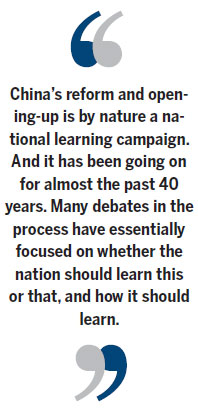There's no need for alarm on trade pact
Updated: 2015-10-09 07:21
By Ed Zhang(China Daily Europe)
|
|||||||||||
The Tpp has sparked fear among some, but WTO experience shows country could benefit in the long run
Is the Trans-Pacific Partnership a fearful thing, as some Chinese commentators have said?
In some commentaries online, the TPP has been translated into Chinese - half-jokingly - as "kicking ass", which certainly does not conjure up a pleasant experience.
The agreement to establish the partnership contains a broad set of rules to enhance free trade and investment and will potentially cover 40 percent of the global economy, including the United States, Japan, Australia and Canada, but not China and India - at least not yet.

The signing of the agreement on Oct 4 was seen by some Western media as a victory for President Barack Obama, achieving the US goal of preventing China from advancing its own "less-free and open standards for trade and investment governance".
"We can't let countries like China write the rules of the global economy," Obama said. "We should write those rules, opening new markets to American products while setting high standards for protecting workers and preserving our environment."
So the Chinese commentators did seem to have reason to fear, because it is meant to be a political instrument in the first place, or at least was described as a political instrument by the US president.
But what is there really to fear? High standards? Rigorous governance? Requirements on transparency? Subjecting domestic law to international treaties and agreements? These are nothing new for the enterprising Chinese.
Just think what China was like in 1978 when its people had just begun to walk out of the shadow of the basically lawless era of Mao's "cultural revolution" (1966-76). All that they have done since then, all the way through China's accession to the World Trade Organization (of which China was not a founding member either) until now, is learn about the market economy and adapt to the international practices.
China's reform and opening-up is by nature a national learning campaign. And it has been going on for almost the past 40 years. Many debates in the process have essentially focused on whether the nation should learn this or that, and how it should learn.

In daily business operations, of course, many attempt to evade the rules, cut under-the-table deals and break the law. They are individual cases and none of them can grow into a respectable company.
The WTO may serve as a good example. Before China's accession to the organization it had endured a long and painful negotiation process for the General Agreement on Trade and Tariffs, the predecessor of the WTO, which the country never managed to sign up to as a member.
Before China officially accepted the WTO terms, misgivings abounded among opinion-makers in Beijing. Some accused the negotiators of treason and of shameless surrender to the standards that foreigners were imposing on their nation.
But as it turned out China has been one of the largest beneficiaries of the WTO. The country's foreign trade volume skyrocketed in the decade after its negotiators allegedly sold off the vaguely-defined national interest.
The potential ability to learn and to compete can be hard to measure if it remains hidden in a society, not completely opened up. And with the institution of equal rights and clear rules, how much change this potential ability can bring about is also hard to imagine. So Chinese entrepreneurs must be thankful to the WTO for its rules.
The TPP reportedly seeks, among other things, to lower trade barriers such as tariffs, to establish a common framework for intellectual property, to enforce standards for labor law and environmental law, and to establish an investor-state dispute settlement mechanism.
For Chinese entrepreneurs, these are not "kicking ass" rules. None of them sounds impossible. And entrepreneurs may contribute to them by insisting on an executive pay limit for government-owned corporations.
However, for the time being it may actually be wise for China to remain a bystander for some time, just to observe how the new trade framework works.
Most importantly, if the TPP really does work, its rules can't be so high and so much in favor of certain countries as to be seen as unreasonable by its small partners. If it applies its rules equally, China, with the size of its economy, shouldn't be afraid of competing with others on an equal footing. And if it is used simply as a weapon against China, as some media commentators have described it, other partners won't be so silly as to never ask what benefit they can get from it.
The author is editor-at-large of China Daily. Contact the writer at edzhang@chinadaily.com.cn
(China Daily European Weekly 10/09/2015 page11)
Today's Top News
FIFA suspends Blatter, Platini from world soccer
Merkel, Hollande appeal to MEPs for EU unity
China adopts IMF statistical benchmark, improves transparency
Fujian governor investigated
China's population to peak in 2025
Beijing says it welcomes TPP deal
Holidayers face hurdles in the homestretch
Snowden: I'd go to prison to return to US
Hot Topics
Lunar probe , China growth forecasts, Emission rules get tougher, China seen through 'colored lens', International board,
Editor's Picks

|

|

|

|

|

|






